
- Strongly Dem (46)
- Likely Dem (2)
- Barely Dem (0)
- Exactly tied (1)
- Barely GOP (5)
- Likely GOP (0)
- Strongly GOP (46)
- No Senate race
Here is a compact table listing all of the Senate candidates.
The current breakdown of the Senate is as follows (where we count the two independents as Democrats):
- 10 Democratic seats up for reelection in 2016 and 36 seats not up, for a total of 46 seats
- 24 Republican seats up for reelection in 2016 and 30 seats not up, for a total of 54 seats
In a reversal from 2014, the Democrats will be playing offense, trying to pick up at least five seats (or four seats and the vice-presidency) in order to reclaim control of the Senate. As they do so, there are several pieces of good news for them:
- The party has had enormous success this year in recruiting top candidates, not only in states where the Democrats' chances are excellent, but also in states where their chances are only middling. By contrast, outside of Nevada, the Republicans have struck out with their preferred candidates.
- There is only one Democratic-held seat that is presently in play (Nevada). In contrast, as many as 16 Republican-held seats are or could be in play, with at least seven of those being in significant danger (Wisconsin, Illinois, Indiana, Pennsylvania, Florida, New Hampshire, and Arizona, in roughly that order).
- The Republicans are defending so many seats they will almost certainly be compelled to do some triage and declare some races to be lost causes.
- Presidential election years favor the Democrats, as they bring more minorities, young people, and single women to the polls.
The news is not all bad for the Republicans, however:
- The 2016 election is not a mirror image of 2014. In that election, the Democrats' "in play" seats were in very red states like Alaska and Montana. This year, the Republicans' "in play" seats are largely in purple or light blue states like Ohio, New Hampshire, Florida, and North Carolina. In other words, the Republicans have an easier position to defend in 2016 than the Democrats did in 2014.
- The tea party's influence has waned, such that the Republicans will not be blowing a competitive race this year by getting stuck with someone like Christine O'Donnell, Todd Akin, or Sharron Angle.
- Even if they lose control of the Senate next year, the 2018 map will once again favor the Republicans, as the Democrats will be defending 23 seats in a nonpresidential year, including those in the red (or reddish) states of Indiana, Missouri, Montana, North Dakota and West Virginia. Should they wish to secure control of the Senate until the next presidential election, the Democrats will likely need a net gain of eight or nine seats this year—a very tall order.
The Democratic-held seats are listed first below, in alphabetical order by state, with the Republican ones following.
Click on a picture for the candidate's webpage.
Click on a name for the candidate's entry in Wikipedia.
Click on a party (D) or (R) for the state party.
The  indicates a race to watch.
indicates a race to watch.
All links open in a new window. Type CTRL-W in the window to close it (Command-W on a Mac).
Democratic-held seats
California
| Challenger | Challenger | Notes Polls |

Kamala Harris (D) |

Loretta Sanchez (D) |
Barbara Boxer is retiring, and it's a two-woman race to be the Democrat that succeeds her. California Attorney General Kamala Harris is the first person of African or Asian descent to occupy that office (her father is Jamaican and her mother is Indian). She thus has ties to two constituencies that play an important role in California politics (7% of the population and 13%, respectively). Harris is also well connected to power brokers within the Democratic Party, who see her as a rising star and a possible presidential candidate in 2020 or 2024. She has the endorsements of President Obama, California governor Jerry Brown, the California Democratic Party, and Boxer herself, among others. The alternative is nine-term representative Loretta Sanchez, who presents a fairly striking contrast to Harris. A former Republican who hails from a conservative district in Southern California, Sanchez is a leading Blue Dog (conservative) Democrat with strong ties to the Latino community. California's jungle primary system means that Sanchez and Harris will face one another in November, despite being from the same party, because they were the top two finishers in the state's June primary. Harris has burned through multiple campaign managers and quite a bit of money, but she's out-fundraising Sanchez by a vast margin ($12 million to $4 million). Sanchez, meanwhile, has a somewhat lackadaisical record as a Representative (she's missed more votes than any other member of California's Congressional delegation) and is running an underwhelming campaign. Several unforced errors, such as accusing Obama of being a racist when he endorsed Harris, have Democratic insiders making liberal use of phrases like "train wreck." Sanchez's only hope is that a lot of Latino voters show up to the polls and a lot of Republicans vote for her to stop the more liberal Harris from winning. The latter scenario is not looking likely; many GOP voters say they will just leave that part of the ballot blank. |
Colorado
| Incumbent | Challenger | Notes Polls |

Michael Bennet (D) |

Darryl Glenn (R) |
Support for Michael Bennet is tepid in Colorado, and given that the state is purplish with a strong libertarian bent, Republicans see this as their second-best opportunity (behind Nevada) to take a Democratic-held seat in 2016. That assessment may technically be accurate, but "second-best chance" does not necessarily mean "good chance." To start, Bennet is the former head of the Democratic Senatorial Campaign Committee (DSCC) and a prodigious fundraiser—he has raised more money this cycle ($12.1 million) than all but four of his Senate colleagues. Further, the Republican side of the contest was a bloodbath, with no less than 14 candidates scrapping with one another for the nomination. Darryl Glenn eventually emerged triumphant, but the Air Force veteran, Trump supporter, and staunch conservative is a very bad match for this purplish state, and he's raised only $350,000 so far. The Kochs, who spent big money in Colorado in 2014, have announced they are sitting this one out, and the GOP appears ready to abandon Glenn to the wolves, so they can focus on playing defense elsewhere. Bennet is safe. |
Connecticut
| Incumbent | Challenger | Notes Polls |

Richard Blumenthal (D) |

Dan Carter (R) |
Richard Blumenthal kept his head down and his nose clean during his first six years in the Senate and now wants a second term, which he will get. A very blue state, Connecticut has no statewide officeholders who are Republican and has not sent a Republican to the U.S. Senate since the 1980s. Wrestling magnate Linda McMahon was the GOP candidate in the last two elections; this time, the party will turn to State Rep. Dan Carter. He has actual political experience, unlike McMahon, but his chances of getting elected won't be much better than hers were. Carter is trying to make hay of an old controversy: Blumenthal's saying he served "in Vietnam," when the truth is that he served in the Marine Corps reserve during the Vietnam era, but never actually left the United States. The issue did not harm the Connecticut Senator six years ago, and it's not likely to have an impact now. |
Hawaii
| Incumbent | Challenger | Notes Polls |
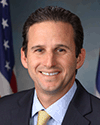
Brian Schatz (D) |

John Carroll (R) |
Hawaii is the bluest state in the Union. When Brian Schatz ran in the 2014 special election to succeed deceased Senator Daniel Inouye, he beat his Republican opponent by 40 points (President Obama did even better in 2012, winning the state by 46). Hawaii has not given its electoral votes to the GOP since the Reagan landslide of 1984, and has only ever elected one Republican to the U.S. Senate (Hiram Fong, who served from 1959 to 1976). This year, the Republican Party will field pilot, lawyer, and perennial candidate John Carroll. He's 86 years old, has gone 0-for-6 in his previous bids for office, has raised $0 so far, and has not updated his campaign website since 2012 (when he last ran for the Senate). This will still be Schatz's seat, then, when the 115th Congress convenes in 2017. |
Maryland
| Challenger | Challenger | Notes Polls |

Chris Van Hollen (D) |

Kathy Szeliga (R) |
Popular senator Barbara Mikulski is retiring after five terms. While Marylanders sometimes elect Republicans to statewide office (e.g., Gov. Larry Hogan in 2014), they turn deep blue when voting for senators. Mikulski won by 25 points in 2010, and her junior counterpart Benjamin Cardin won by 30 in 2012. The drama, then, was in the Democratic primary. Emerging victorious after a brutal, racially-polarized contest was seven-term representative Chris Van Hollen, who managed to comfortably outpoll Rep. Donna Edwards. Born in Pakistan to an officer of the U.S. Foreign Service, he has won much praise for his expertise in foreign affairs and budgetary matters. In the general election, he will face Maryland House Minority Whip Kathy Szeliga, who he has already attacked for raising money for Citizens United, and also for being pro-Trump. Neither of these things pleases Marylanders; Trump is so unpopular in the state that even Governor Hogan says he won't vote for him. Van Hollen has also out-fundraised Szeliga by a margin of 10-to-1. She's trying to fight back by pointing out Van Hollen's lack of private sector experience, but the criticism doesn't seem to be moving the needle. So, all signs point to a landslide. |
Nevada 
| Challenger | Challenger | Notes Polls |

Catherine Cortez-Masto (D) |
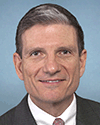
Joe Heck (R) |
Senate Minority Leader Harry Reid is retiring after five terms—perhaps because of age, perhaps because of a recent injury that left him blind in one eye, perhaps because he is tired of tough reelection campaigns. The most likely explanation, however, is that he beat nondescript, gaffe-prone tea partier Sharron Angle by only 6 points in 2010 and might well lose to a more serious candidate in 2016. Whatever the case may be, Reid will yield the Democratic mantle to his handpicked successor, Catherine Cortez Masto, who served eight years as Attorney General of Nevada before being term limited. If elected, she would be the first Latina to serve in the U.S. Senate (though she might end up sharing that honor with Loretta Sanchez). Enjoying wide name recognition across the state, Masto will have the considerable financial and logistical resources of Reid's political network at her disposal. The Republican candidate will be two-term representative Joe Heck, who surprised and delighted the party establishment when he decided to run. A physician and brigadier general in the U.S. Army Reserve, Heck is an excellent campaigner and fundraiser who gives the Republicans far and away their best chance to capture a Democratic-held Senate seat in 2016. In Nevada's primary, Heck easily brushed aside a challenge from Angle, who unwisely decided she would return for another bite at the apple. This looks to be a very close race, and millions of dollars have already poured in from outside of Nevada (about $10 million on each side). The airwaves in Nevada are already full of nasty commercials, and there will be even more as the campaign moves toward its conclusion. The Koch brothers are targeting the state for some of the money that they won't be spending on the presidential contest, and Sheldon Adelson is using his shiny new toy, The Las Vegas Review-Journal, to promote Heck's campaign. The deciding factor could well be how many of the state's 780,000 Latinos and 234,000 Asians go to the polling place on Election Day. |
New York
| Incumbent | Challenger | Notes Polls |

Chuck Schumer (D) |

Wendy Long (R) |
New York is a very blue state and Chuck Schumer is popular, has $27.5 million in the bank (twice as much as any other 2016 Senate candidate), and knows how to make use of the advantages of incumbency. He is also an aggressive self-promoter. As Bob Dole once observed, "The most dangerous place in Washington is between Chuck Schumer and a camera." (This infinitely recyclable joke was originally told about Theodore Roosevelt more than a century ago). Schumer won his last election by 33 points, and the one before that by nearly 50. His opponent will be lawyer Wendy Long, a political novice whose main claim to fame is losing the 2012 Senate race to Kristen Gillibrand by 43 points. There's nothing to see here, then, unless you happen to like carnage. Once he wins his fourth term, Schumer is expected to take over for Harry Reid as leader of the Senate Democrats. |
Oregon
| Incumbent | Challenger | Notes Polls |

Ron Wyden (D) |

Mark Callahan (R) |
A cancer scare had Ron Wyden considering retirement, but he's healthy now and gunning for a fifth term. He is one of the most liberal members of the Senate, and that suits deep-blue Oregon just fine; voters have bestowed an average margin of victory of 30 points upon him in his three previous reelection campaigns. Meanwhile, there is no Republican bench in the state. The only member of the GOP currently representing Oregon at either the state or federal levels is Rep. Greg Walden, and he is content to keep his very safe seat in the House. Therefore, the red team is left with IT consultant Mark Callahan, whose hobby is running for political office (including a "campaign" for president in 2012). It would be hard to come up with a worse candidate, since Callahan has a bankruptcy and a messy divorce in his past, and has switched from Green to Democrat to Republican depending on the election he was contesting. He's also raised $20,000 to Wyden's $7.5 million. Moving on. |
Vermont
| Incumbent | Challenger | Notes Polls |

Patrick Leahy (D) |

Scott Milne (R) |
Patrick Leahy is, interestingly, the only Democrat ever elected to the U.S. Senate from the state of Vermont. That unexpected quirk is a byproduct of his extremely long term of service, coupled with the fact that his junior colleague Bernie Sanders is so far left that he runs as a Democratic Socialist. When Leahy began his career in the 1970s, Vermont was reddish-purple, and he had to contend with difficult campaigns and close elections. However, he has not had to break a sweat since the last time a Clinton tried to move into the White House—1992—when he won by "only" 10 points. Vermont was in the process of turning very blue then, and Leahy has won every election since by at least 35 points. Now the Dean of the Senate, he will easily win an eighth term, putting him within striking distance of Robert Byrd's record nine terms and 51 years in the Senate. His sacrificial lamb...er, challenger...will be Scott Milne, a travel agent and political novice who presently has the princely sum of $83 in the bank. Milne ran for the governorship of Vermont in 2014, and even kept the race close, but he won't do the same this time. |
Washington
| Incumbent | Challenger | Notes Polls |

Patty Murray (D) |

Chris Vance (R) |
Patty Murray was nearly toppled by the Republican wave in 2010, winning her fourth term by less than 4 points. Her position is stronger now; she played a leading role in averting a government shutdown in 2013, and this cycle she has raised an impressive $8 million for her campaign. Her opponent is former State Rep. Chris Vance, who served one term in the early 1990s and has also been chair of the Washington Republican Party. He's no threat; Murray is going to get her fifth term. |
Republican-held seats
Alabama
| Incumbent | Challenger | Notes Polls |

Richard Shelby (R) |

Ron Crumpton (D) |
The last time Alabama sent a Democrat to the U.S. Senate was in 1994, when they elected...Richard Shelby. Then a Dixiecrat who was finishing his first term, he promptly changed parties after the election and became part of the "Contract with America" Republican wave. In the two decades since, Alabama has gone from being light red (+6 for Bush in 1992 and for Dole in 1996) to deep red (+22 for Romney), and Shelby has consistently won by a 2-to-1 margin when up for reelection. No Democrat stands a chance against him in 2016. Consequently, the best the Party could come up with is political novice and marijuana activist Ron Crumpton, who—appropriately enough—appears to be stoned in every picture he's ever posed for. This is not going to play well in socially-conservative Alabama, as indicated by the fact that Shelby has $9.8 million on hand, while Crumpton has $3,910 (most of which is presumably earmarked for snacks). Crumpton's dream of going to the U.S. Senate will go up in smoke on Election Day. |
Alaska 
| Incumbent | Challenger | Notes Polls |

Lisa Murkowski (R) |

Ray Metcalfe (D) |
During her first full term in the Senate, Lisa Murkowski was a reliable "Main Street" (moderate) Republican. Her reward for this, when she ran for reelection in 2010, was to be primaried by tea partier Joe Miller. Murkowski countered by running as an independent, becoming only the second person to win a regular U.S. Senate election as a write-in candidate (the first was Strom Thurmond, and he did it with a name that is much easier to spell). In her second term, Murkowski has moved in a centrist direction, presumably an acknowledgment that the far right of the political spectrum is a lost cause. She is currently the most popular politician in Alaska (sorry, Sarah Palin!) and has more than $2.4 million on hand—a veritable fortune in Alaska, where men are men and advertising is cheap. Her Democratic opponent will be Ray Metcalfe, a former state legislator and vocal Bernie Sanders supporter whose progressive views are out-of-step with Alaska voters. He is currently, and openly, at war with the Alaska Democratic Party. It is likely that the biggest threats to Murkowski come from third-party candidates; there may be as many as three of them who give the Senator something to worry about. The first is retired U.S. Army colonel Margaret Stock, who is running as an independent. A Harvard-educated immigration attorney and former law professor, she is also recipient of a MacArthur Foundation "genius" grant. In addition to immigration, she is a specialist in national security issues, and she regularly consults for the U.S. Army. The second is Miller, who is still beloved by tea partiers, and who swooped in to claim the Libertarian nomination when Cean Stevens dropped out of the race. The third is former senator Mark Begich (D). He is, ironically enough, thinking seriously about a write-in campaign. Given Alaska's relatively small population, as well as the possibility that the vote will be split five ways, it could get dicey for Murkowski. |
Arizona 
| Incumbent | Challenger | Notes Polls |
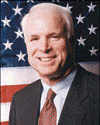
John McCain (R) |

Ann Kirkpatrick (D) |
As he tries for a sixth term, John McCain has the advantages of near-universal name recognition, $5 million in the bank with a prodigious ability to raise more, and status as a war hero for everyone except Donald Trump. In solidly red Arizona, his margin of victory in his five previous Senate contests has never been less than 24 points. However, that's where the good news ends, as the 2008 GOP presidential nominee is now facing the fight of his life. To start, he has drawn a formidable opponent in popular Democratic representative Ann Kirkpatrick. She was unopposed in the primaries, and so was able to sit on the sidelines and watch while McCain had to grapple with tea partier Kelli Ward. On top of that, the Senator has been hit by scandal, as one of his lead fundraisers (Emily Pitha) was arrested for running a meth lab. And if the triple play of Kirkpatrick, Ward, and Pitha were not enough, there's also The Donald. Put briefly, McCain will need some votes from Arizonans who support Trump. And he will need some votes from Arizonans who hate Trump. He is thus engaged in a perilous high-wire act, trying to embrace Trumpism, but not to embrace it too enthusiastically. It will not help McCain that, no matter how carefully he juggles, Trump is likely to draw an inordinate number of the state's 2 million Latinos to the polls to vote a Democratic ticket. McCain is also doing a delicate dance on increasing the minimum wage, which Kirkpatrick and 75% of Arizona voters support, but much of the Senator's base bitterly opposes. And finally, the cherry on top of McCain's sundae full of trouble is that he will be 80 on Election Day, has a lengthy history of nagging health problems, and has publicly acknowledged that he's running out of steam. What it all adds up to is that a seat that has been safely Republican for decades (since 1968, to be precise) is now in toss-up territory, and if any giant of American politics is going to be toppled in 2016, it is likely to be John Sidney McCain II. |
Arkansas
| Incumbent | Challenger | Notes Polls |
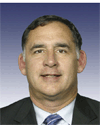
John Boozman (R) |

Conner Eldridge (D) |
John Boozman won his first Senate contest by 21 points, one of the many Republican successes in the 2010 midterm elections. As time passes, however, this victory is seeming more and more like it came despite Boozman, rather than because of him. He has proven to be a poor fundraiser and an unpopular senator, with a mediocre 34% approval rating. He has also had health problems, including emergency bypass surgery in 2014. These things being the case, he will be more vulnerable than most Southern Republicans. The Democratic establishment tried to recruit a strong opponent, such as former governor Mike Beebe, but ultimately ended up with federal prosecutor Conner Eldridge. Eldridge will have an uphill battle, but he's not a sitting duck, and he may benefit from Hillary Clinton's coattails and from Bill Clinton campaigning in the state. Eldridge is working to connect Boozman with Donald Trump, and has been airing a commercial full of Trump's misogynistic statements in an effort to curry favor with women voters. He has also come out in favor of legalized medical marijuana, which should help with libertarian-leaning and younger voters. Boozman has outraised Eldridge, $3 million to $1 million, which isn't a great margin for an incumbent, and he is nervous enough that he is trying to avoid having a debate. The bottom line: Bet on Boozman, if you must, but don't bet much. |
Florida 
| Challenger | Challenger | Notes Polls |

Marco Rubio (R) |

Patrick Murphy (D) |
As we learned in 2000, Florida is a large state with many different constituencies, and is fairly evenly divided between Republicans and Democrats. These facts set the stage for a battle royale that could be the most expensive Senate race in U.S. history. On the Democratic side it will be Patrick Murphy, a moderate (and a former Republican) who easily defeated outspoken lefty Alan Grayson in the Democratic primary. He has the backing of the Democratic establishment, and has raised more than $11 million so far. On the Republican side, Sen. Marco Rubio (R-FL) declared that he was retiring. Then, just days before the filing deadline, he decided he wasn't. Most of his competition promptly cleared out, and the remainder were easily dispatched in the primary. For the general election, though, Rubio has some hurdles to overcome. Floridians know of his disdain for the Senate and his poor attendance record, and they handed him a pretty stinging rebuke in the presidential contest. Further, Rubio refuses to promise that he will finish his second term, making it very clear that his real goal is to mount a second presidential run, and not to be an advocate for Floridians. On top of that, the midterm electorate that sent him to Washington the first time is rather different than the electorate he'll face in November, and he's gotten a very late start on fundraising and building a campaign organization. Thus far, however, the advantages of incumbency and name recognition are carrying the day, and Rubio consistently leads in polls. Murphy is trying to hit him in areas of weakness, like gun control, a particularly salient issue in Florida after the Orlando massacre. The Representative needs to gain some more traction in a hurry; the DSCC has canceled ad buys for two weeks in a row, and if they're not convinced he can make a race of it, they are likely to decide their money is best spent elsewhere. |
Georgia
| Incumbent | Challenger | Notes Polls |

Johnny Isakson (R) |

Jim Barksdale (D) |
Johnny Isakson is popular in Georgia, having won his first two Senate races by 18 and 19 points, respectively. He loves Jesus and hates taxes, gay marriage, abortion, and Obamacare, so he's not vulnerable to a challenge from the right. In June of 2015, he revealed that he has been diagnosed with Parkinson's disease, but thus far the news has not affected his reelection plans. The Democratic candidate will be Jim Barksdale, an investment manager and political novice. Normally, someone with that resume would be cannon fodder, but Barksdale is running a very effective Bernie Sanders-style outsider campaign, promising to take on the banks and the Washington insiders. Like Sanders, he even makes fun of his own fashion sense, and is selling Barksdale flat caps on his website. Unlike Sanders, however, he was able to write his campaign a check for $3 million. He won an easy victory in the primaries, and the first poll of the general election matchup had Isakson up by only 12 points. That's a very poor number for an incumbent, since Barksdale's support has room to grow, while Isakson's probably does not. Like his colleague John McCain, Isakson is having trouble with Donald Trump, as he needs the votes of both Trump supporters and Trump opponents. And, like his colleague John Boozman, he's trying to avoid a Senatorial debate. With Libertarian Allen Buckley polling in the high single-digits, it is entirely possible that this ends up in a runoff on January 10. Indeed, between Georgia and Louisiana (see below), it's very possible that on November 9, we will have a new president, but we won't yet know which party won control of the Senate. |
Idaho
| Incumbent | Challenger | Notes Polls |

Mike Crapo (R) |

Jerry Sturgill (D) |
Mike Crapo was bracing for a possible primary challenge from Rep. Raul Labrador, but Labrador decided to remain in the House. Meanwhile, the Democratic Party of Idaho is like the Loch Ness monster—rumored to exist, but actual evidence is scarce. They have not managed to get a senator elected since the 1970s, and that streak will continue in 2016. The only Democratic candidate to declare before the filing deadline was Jerry Sturgill, a lawyer and investment banker who is a political unknown. The only real question in this race is whether Crapo will improve upon the 71% of the vote he received in 2010. |
Illinois 
| Incumbent | Challenger | Notes Polls |

Mark Kirk (R) |

Tammy Duckworth (D) |
Mark Kirk was a very moderate representative, and for the past six years he's been a very moderate senator. Unfortunately for him, "moderate Republican" was barely viable in the Republican wave of 2010 (Kirk won his seat by less than 2 points), and in presidential years Illinois turns very blue. The Senator's tendency to put his foot in his mouth is not helpful, either. In just the last year, he has had to apologize for characterizing bachelor Sen. Lindsey Graham (R-SC) as "a bro without hos," for describing black communities as "the one(s) we drive faster through," and for accusing President Obama of trying to "get nukes to Iran." If these liabilities were not enough, Kirk also suffered a serious stroke in early 2012, which was followed by a long and arduous recovery. He has been running a commercial, entitled "Courage," that tries to curry favor by linking his military service and his fight to overcome this disability. That commercial would be much more helpful if his opponent were not Tammy Duckworth, who lost both legs while serving as a helicopter pilot during the Iraq War. A charismatic two-term representative, Duckworth is the first disabled woman ever elected to the House, and the first Asian American to be elected to Congress from Illinois (she's Thai). Though she has no statewide experience, She passed her first test with flying colors, crushing Chicago Urban League President and CEO Andrea Zopp in the primaries. She's hitting Kirk hard right now, particularly focusing on his habit of embellishing upon his military record. The incumbent Senator is fighting an uphill battle, then, and he will largely have to go it alone. He already repudiated his party's presidential nominee, and is running as something of an independent. GOP groups outside the state are giving virtually nothing to his campaign, since they see Illinois as a lost cause. Duckworth is likely going to be elected Illinois' new junior senator. |
Indiana 
| Challenger | Challenger | Notes Polls |

Todd Young (R) |

Evan Bayh (D) |
Indiana is a fairly red state, but the retirement of Sen. Dan Coats has put this seat into play. On the Republican side of the contest, the candidate will be three-term representative Todd Young, who fended off a challenge from tea partier Marlin Stutzman. Young is a Naval Academy graduate, a former marine, a stellar campaigner and fundraiser, and he has the strong support of the GOP establishment, particularly Senate Majority Leader Mitch McConnell (R-KY). The conservative super PAC Senate Leadership Fund has allocated $4 million to pro-Young advertising, the U.S. Chamber of Commerce has chipped in $1 million, the Koch Brothers have also given $1 million and will likely give more. The Democrats thought their candidate was going to be former five-term representative Baron Hill, but on July 11 he unexpectedly dropped out of the race. Fortunately for the blue team, Hill was replaced by former Indiana Secretary of State, two-term governor and two-term senator Evan Bayh, the son of former three-term senator Birch Bayh. Needless to say, the Bayh name is exceedingly well known in Indiana, while Young has limited name recognition. Plus, Bayh has $9.3 million in the bank left over from his previous time as senator. What seemed like a moderately easy hold for the Republicans has now become a hotly contested race, with the blue team having the edge. George W. Bush is now campaigning for Young, though whether or not that will help is anyone's guess. The campaign has also, to nobody's surprise, taken on a very nasty edge. Young has called Bayh a carpetbagger, Bayh has slammed Young's record on Social Security and his support for Donald Trump. Hoosiers are going to be very tired of negative commercials by the time this thing's over. |
Iowa 
| Incumbent | Challenger | Notes Polls |

Chuck Grassley (R) |

Patty Judge (D) |
Chuck Grassley will be 83 on Election Day and briefly considered retirement before committing to run for his seventh term. He is very popular in Iowa, thanks in particular to his success in bringing home the pork (in a state that loves pigs), and to his custom of holding a public meeting with constituents in each of Iowa's 99 counties every year. Though the state has been trending blue, particularly in presidential years, Grassley has been impervious to such forces. In 1992, for example, Bill Clinton won Iowa by 5 points and Grassley still beat his Democratic opponent by 42. However, thanks to his chairmanship of the Senate Judiciary Committee, he is now the poster child for the GOP's controversial choice to delay consideration of a possible replacement for Antonin Scalia. This caused a serious Democratic challenger to enter the race—her name, appropriately enough, is Patty Judge. Having served as Iowa's Secretary of Agriculture and Lieutenant Governor, she has name recognition and a political network. This race could get national attention, not only because of the potential to flip a GOP-held seat, but also as a bellwether for the impact of the Scalia issue. If obstructing Merrick Garland can bring down Chuck Grassley, it can bring down just about any senator. He's still in the driver's seat, but the Democrats are starting to turn up the heat, and even Al Gore has come out of the woodwork to campaign for Judge. This one could turn into a squeaker, though it's not there yet. |
Kansas
| Incumbent | Challenger | Notes Polls |

Jerry Moran (R) |

Patrick Wiesner (D) |
Kansas was staunchly Republican when the GOP was the more liberal party, and remained so as it became the more conservative party. The last time the state's voters sent a Democrat to the U.S. Senate, they also gave their electoral votes to an upstart governor from New York who promised a "New Deal" for Americans. In other words, Jerry Moran does not need to be worried about the Democrats, and as a proud member of the Tea Party Caucus, his right flank is also safe. A pair of Democrats decided at the last minute to run; lawyer, accountant, and political unknown Patrick Wiesner won the opportunity to lose to Moran, who will hold this seat for as long as he wants it. |
Kentucky
| Incumbent | Challenger | Notes Polls |

Rand Paul (R) |

Jim Gray (D) |
Kentucky has a reputation for being a solidly red state, but that's largely at the federal level. In state elections, Kentuckians often lean fairly Democratic (though that did not hold true in 2015). Rand Paul—who is only moderately popular—is vulnerable to a serious Democratic challenge, and he's got one from Lexington Mayor Jim Gray. Gray is wealthy (and so can self-fund), has a reputation for being a "straight shooter," has a small business background, and is openly gay. He thus has something of a maverick persona that actually plays quite well in the Bluegrass State. He has already "loaned" his campaign $1 million and is running ads that, shockingly, focus on his selling points, rather than his opponent's weaknesses. Paul does have weaknesses, of course; his strongly libertarian views are out of the Republican mainstream, and Kentuckians are not thrilled that he used them as his "insurance policy" against a failed presidential run. So, what should have been a safe seat for the Republicans is now looking like it could be play, though time is starting to run short. |
Louisiana
| Incumbent | Challenger | Notes Polls |

Candidate Unknown (R) |

Candidate Unknown (D) |
This race is currently up in the air. After being defeated in Lousiana's gubernatorial election, amidst a series of debilitating scandals, incumbent Sen. David Vitter announced his retirement. And the state's other nationally-prominent Republican, Bobby Jindal, is even more unpopular. That has cleared a path for Reps. John Fleming and Charles Boustany, former Rep. Joseph Cao, and State Treasurer John N. Kennedy to enter the race. It's turned into a good old-fashioned, down and dirty, Bayou-style campaign: A new book claims Boustany regularly utilized the services of prostitutes, who later turned up dead. Boustany denies the charges, quite plausibly, and says Fleming's campaign is behind the book. Fleming's campaign insists they had nothing to do with it, and that they have no idea who stole the plot of The Godfather, Part II. Fleming is also the current fundraising champion, with just shy of $2.5 million in the till, though polls actually favor State Treasurer John N. Kennedy. There are five other Republicans, including former KKK Grand Wizard David Duke, but they are non-factors. Given the weakened state of the Louisiana GOP, as well as the fact that 2016 is a presidential year, this could be an excellent pickup opportunity for the Democrats. However, they have struggled to find a top-flight candidate. Ultimately, a grand total of eight Democrats declared; the most interesting is Gary Landrieu. As a first cousin of the dynastic Landrieu family, his last name has magic powers in the Bayou State. However, he's not one of the stars of the family; Moon, Mitch, and Mary all opted out. In other words, we're talking Patrick Kennedy here, not John or Bobby or Teddy. There is no primary in Louisiana; all declared candidates will appear on the general election ballot. If the Democrats can somehow persuade the unknowns to drop out, it's possible that Landrieu could monopolize the Democratic vote and come out ahead if the Republican vote splits two or three or four ways. He would still have to survive a December 10 runoff if he did not collect at least 50% of the vote, a runoff that would get national attention (and tens of millions of dollars) if control of the Senate hangs in the balance. |
Missouri 
| Incumbent | Challenger | Notes Polls |

Roy Blunt (R) |

Jason Kander (D) |
Roy Blunt is an incumbent, represents a red state, and—though a moderate—was able to avoid a serious challenge from the right this year thanks to the Todd Akin "legitimate rape" fiasco in 2014. That is the good news for the Senator. The bad news? His approval ratings are among the worst in Congress, with considerably more than half of Missourians unhappy with the job he is doing. Further, the Democrats have recruited a very strong candidate in Missouri Secretary of State Jason Kander, a charismatic military veteran who is currently (at 35) the youngest statewide elected official in America (and the only one born in the 1980s). If the Missouri governor's race is as close as expected, it could bring a higher than average number of Democrats to the polls. So too could having a candidate whose husband used to govern next-door neighbor Arkansas at the top of the ballo(in both 1992 and 1996, Bill Clinton won Missouri, making him the last Democrato do so). The race has already turned ugly, with Blunt slamming Kander for being anti-gun. Kander responded by airing a commercial that has everyone talking: It shows him assembling an AR-15 rifle (and talking about his military service) while blindfolded. Kander has also hit Blunt over the SCOTUS obstructionism, and painted him as a Washington insider, a carpetbagger (largely because Blunt, who was born in Missouri, was photographed wearing a Washington Nationals cap), and a Trump toady. Blunt is still a slight favorite, but this seat is an excellent pickup opportunity for the Democrats. |
New Hampshire 
| Incumbent | Challenger | Notes Polls |

Kelly Ayotte (R) |

Maggie Hassan (D) |
New Hampshire is becoming bluer by the year, and though Kelly Ayotte is fairly moderate and fairly popular, the trend may catch up with her eventually. Will that be in 2016? The answer is in the hands of the state's most popular Democrat, Gov. Maggie Hassan, who decided to forego a third term as governor to mount a challenge. This compelled Ayotte to pivot toward the center, criticizing Sen. Ted Cruz (R-TX) as extremist, and also praising President Obama's climate change accord. Those statements angered many New Hampshire Republicans, who are also less-than-thrilled that she's not a Second Amendment zealot (even though she has an 'A' from the NRA). Some of those voters may stay home or vote third party on Election Day. Donald Trump has also been badmouthing Ayotte, though who knows if this will hurt or help her. Meanwhile, Hassan has a major headache of her own to deal with: Rick Schubart, a former teacher at exclusive Phillips Exeter Academy who was recently dismissed from the school for engaging in multiple acts of sexual misconduct with students. Hassan's husband was a principal at the school, and Schubart even donated money to her previous political campaigns. At best, say Republicans, the situation shows poor judgment on Hassan's part, and at worst, maybe she helped facilitate a coverup. As with Missouri, the candidates here have already been playing political football with Antonin Scalia's replacement, which will give party leaders on both sides another reason to watch this race with interest. There has also been arguing about the state's problem with heroin addiction. So, the mud is flying. The key factor in the race could prove to be money; thus far about $12 million has been spent by Hassan and her surrogates, while Ayotte & Co.'s spending is just less than $6 million. Apparently, GOP activists outside the state, particularly the Kochs, feel that Ayotte is too much a RINO. By Election Day, the gap in spending could exceed $10 million; that will be hard for Ayotte to overcome. |
North Carolina 
| Incumbent | Challenger | Notes Polls |

Richard Burr (R) |

Deborah Ross (D) |
As Richard Burr tries for a third term in this purple state, his mediocre approval ratings (around 35%) have Democrats sensing an excellent pickup opportunity. However, party officials got their biggest disappointment of the 2016 campaign (so far) when former senator Kay Hagan declined to enter the race. Her decision is not terribly surprising, given the challenges of running for a Senate seat in North Carolina. To start, the state's numerous large and distinct media markets make statewide elections very expensive. Indeed, Hagan's loss to Thom Tillis in 2014 was the most costly U.S. Senate contest ever, with a total of $111 million expended. In addition to the stresses of constant fundraising, it is also the case that North Carolinians like to change senators as regularly as some people change socks. In most states, after a difficult first election, a sitting senator has a huge advantage in any subsequent contest and can coast a little bit (or, sometimes, a lot). Not in North Carolina, where 13 of the last 14 Senate races have been decided by single digits, and where each of the nine senators elected between Jesse Helms in 1972 and Burr in 2004 survived for only a single term (or less). So, the Democrat won't be Kay Hagan, it will be the much less visible former State Rep. Deborah Ross, a pragmatic moderate in the mold of Hillary Clinton. Burr easily fought off a challenge from the right in the form of physician Greg Brannon, while Ross scored an equally overwhelming victory over three challengers on the Democratic side of the contest. The DSCC wants the Tar Heel state badly, and will steer lots of resources to Ross. North Carolina is also a place where the negative impact of Donald Trump could be palpable, so Burr has reason to be nervous. It does not help him that he's enmeshed in a mini-scandal right now, having directed $200,000 of PAC money to his in-laws and son in the past 16 years. It's not illegal, but it's not a good look, either. This race has been tightening since the primaries, and is getting close to "toss up" territory. |
North Dakota
| Incumbent | Challenger | Notes Polls |

John Hoeven (R) |

Eliot Glassheim (D) |
John Hoeven may be the most popular politician in North Dakota, having served 10 years as governor prior to his first term in the Senate. In Washington, he compiled a voting record designed to keep constituents happy—anti-ObamaCare, anti-immigration, pro-life, pro-Keystone pipeline. North Dakota voters are not entirely averse to voting for Democrats—including their other senator, Heidi Heitkamp—but overall the state is very red. Further, the Democratic bench there is paper-thin. After the deadline for volunteers passed, the party persuaded State Rep. Eliot Glassheim to give it a shot. The fact that he's 78—a bit long in the tooth to be starting a Senate career—and that his campaign "website" is a Facebook page suggests that his only chance of getting elected is if Hoeven is caught in bed with a live boy or a dead girl (to borrow Edwin Edwards' phrase). |
Ohio 
| Incumbent | Challenger | Notes Polls |

Rob Portman (R) |

Ted Strickland (D) |
If you look up 'bellwether' in the dictionary, you will find a picture of Ohio. The last time the state failed to give its electoral votes to the winning presidential candidate was 1960, and in the half-century since, Ohioans have split their electoral and Senate votes only twice (John Glenn/Ronald Reagan in 1980 and Howard Metzenbaum/George H. W. Bush in 1988). So, no Senate race is more likely to be affected by the presidential contest than this one—both parties will have their get-out-the-vote operations working at full capacity, and the one that is more successful may well decide whom Ohio sends to the Senate. During his first term, Rob Portman did his best to improve his reelection odds: He traveled to more than 30 countries in order to develop a reputation as a foreign policy specialist, strengthened his ties to the establishment by serving as chair of the National Republican Senatorial Committee, and banked an impressive $10 million in campaign funds. However, his approval ratings are anemic. The Democrats' candidate is former governor Ted Strickland, who has had a terrible campaign so far, losing the endorsement of several labor unions, and worrying Democrats with his passive approach. He's also lagging Portman in the fundraising department, $7 million to $15 million. Strickland has consistently been down 5-6 points in the polls, and the problem seems to be getting worse rather than better. As such, both Republican and Democratic super PACs have halted the flow of money to Ohio, thinking that there might be better races in which to invest. If Strickland does not turn things around soon, he's likely going to be on his own, and praying for big, blue coattails. |
Oklahoma
| Incumbent | Challenger | Notes Polls |

James Lankford (R) |

Mike Workman (D) |
Oklahoma is probably the reddest state in the nation, the only one in which Barack Obama never won a single county. James Lankford is a good match for his constituents, an arch-conservative who laments not only ObamaCare but also Medicare, who would like to shut down the EPA, and who wants to dramatically expand the Patriot Act. After winning the 2014 special election to finish Sen. Tom Coburn's unexpired term, Lankford wants a full term in his own right. His opposition will be Mike Workman, a teacher and political consultant who was crushed the one time he ran for political office. Soon, that will be "both times he ran for political office." |
Pennsylvania 
| Incumbent | Challenger | Notes Polls |

Pat Toomey (R) |

Katie McGinty (D) |
Although Pennsylvania is the state that gave us Rick Santorum, it is actually quite blue in presidential years. Pat Toomey has been something of a mirror image of Santorum—fiscally conservative, but socially moderate. He barely eked out a victory over Joe Sestak in the Republican wave year of 2010, and so he has reason to be concerned heading into 2016. That said, Toomey will benefit from his low-key, non-confrontational nature—which Pennsylvanians like in their politicians. The Democrat will be Katie McGinty, an environmentalist with strong ties to the Clintons and to power brokers in Pennsylvania, but zero experience in elective office. With strong establishment backing, she won a bruising primary over the maverick Sestak, who was back for another go-round. If she is elected, she will be Pennsylvania's first female senator, and the Party is hoping that a Hillary Clinton-Katie McGinty ticket will attract a lot of women voters. The DSCC will go all out to make sure McGinty has plenty of resources in what will certainly be one of the highest-profile Senate races. Gun control has become a big issue following the Orlando shootings, since Toomey helped defeat a bill that would have banned suspected terrorists from buying guns. He's trying to take a moderate position on the Second Amendment, is being hit by McGinty and her allies for being too gun-friendly, and is also being hit but gun-rights groups for not being gun-friendly enough. In fact, some Second Amendment groups are advising a vote for McGinty, so as to send a message to other politicians who dare to soften their stance. McGinty has been surging as of late, and is leading fairly consistently in polls, but Toomey just landed the endorsement (and potential financial support) of Michael Bloomberg as well as a financial commitment from the Kochs. So, this one is still up in the air. |
South Carolina
| Incumbent | Challenger | Notes Polls |
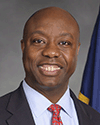
Tim Scott (R) |

Thomas Dixon (D) |
South Carolinians like their Senators ultra-conservative and Tim Scott, who was appointed (and then elected) to finish Jim DeMint's unexpired term, fits the bill. A devout evangelical Christian, Scott strongly opposes Iran, abortion, ObamaCare, labor unions, and earmarks for 49 of the 50 states (the $300 million for dredging Charleston's harbor, he argued, was about job creation and not pork). The lone Democrat to declare is Thomas Dixon, a pastor and activist who co-founded The Coalition: People United to Take Back Our Community. He is also a political novice who acknowledges being an alcoholic and drug addict, and who has spent time in prison. There may be states where that would not be a deal-breaker (Nevada?), but South Carolina is not one of them. This one is about as safe as it gets for the GOP. |
South Dakota
| Incumbent | Challenger | Notes Polls |

John Thune (R) |

Jay Williams (D) |
The state that was home to liberal three-term Democratic senator and presidential candidate George McGovern, as well as more recent three-term Democratic senators Tom Daschle and Tim Johnson, is now deep red. So much so, in fact, that John Thune ran unopposed in 2010. The Democrats are stuck with political neophyte Jay Williams, who—when he announced his intention to run—explained that he's very qualified for office because he has a degree in political science. Williams is going to get crushed, of course. |
Utah
| Incumbent | Challenger | Notes Polls |

Mike Lee (R) |

Misty Snow (D) |
Mike Lee is very conservative, which Utahns like just fine—he won each of his first two Senate elections by 30 points. His Democratic opponent is going to be Misty Snow, a late entry who—if elected—would become the first transgender U.S. Senator. While it is true that Salt Lake City has a gay mayor, that's going to be a bridge too far for rural dwellers and residents of more socially-conservative cities like Provo and Orem. Lee is going to win this one in a walk. |
Wisconsin 
| Incumbent | Challenger | Notes Polls |

Ron Johnson (R) |

Russ Feingold (D) |
Ron Johnson won a close election over Russ Feingold in 2010 (51% to 47%) and then served a fairly lackluster first term. He has particularly been hurt by his highly publicized confrontation with Hillary Clinton during the congressional hearings on Benghazi, and also by his propensity to shoot from the hip. Among other impolitic moments, he has suggested that those who take out student loans are lazy, those who utilize ObamaCare are moochers, and has referred to American Muslims as "those people." He's also being investigated on an ethics charge stemming from a $10 million payment he received from his former firm shortly before becoming a senator. The Wisconsin Democratic Party argues that it's either an illegal corporate contribution, or that Johnson falsified his financial disclosure forms. The Senator's opponent is Feingold, who will attempt to become only the second senator in history to reclaim his seat in a rematch (the first was Peter Gerry of Rhode Island, who lost his reelection bid in 1928 but came back to defeat GOP senator Felix Hebert in 1934). Feingold has has some pretty serious baggage of his own, however. Having made a name as a campaign finance reformer, he declined most outside funds in 2010. Though perhaps a sincere gesture, this crippled his campaign and contributed substantially to his defeat. Now, Feingold will accept that money ($15 million so far), which will be helpful on a practical level but will also open him up to charges of hypocrisy. In addition, after leaving office, the PAC that Feingold founded—Progressives United—appears to have spent considerably more money on Feingold's salary and on buying copies of his book to give out as "gifts" rather than actually lobbying for progressive causes. And he too is being investigated; the Wisconsin GOP insists that Feingold began his Senate campaign while serving as U.S. Special Envoy for the African Great Lakes Region and the Democratic Republic of the Congo. If true, that would be a no-no. On balance, it looks like Johnson's baggage is more problematic than Feingold's, because the Democrat is starting to pull away in the polls. It's the reverse of the situation in Ohio, but with the same result: Both parties are starting to redirect their money to more competitive races, leaving the underdog to face the possibility of going it alone. |
